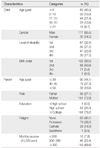Abstract
Purpose
The purpose of this research was to develop a scale to measure the life transition process of parents of children with autism, against the backdrop of a lack of research on this topic.
Methods
Seventy preliminary items were drawn from previous qualitative research, and content validity was tested by three professors as well as three parents of children with autism. A questionnaire survey was also done between August 2011 and February 2012. Data were collected from 207 parents of children with autism and analyzed using descriptive statistics, item analysis, Cronbach's alpha, Pearson correlation coefficients, and factor analysis with the SPSS Win 15.0 program.
Results
Twenty-nine items were selected to constitute the appropriate measuring scale and categorized into 5 factors explaining 63.2% of the total variance. The 5 factors were named; stages of denial (5 items), wandering (6 items), devotion (7 items), frustration (3 items), and finally acceptance (8 items). Cronbach's alpha for the 29 items was .80.
References
1. An HY. The effect of child abuse prevention program for parents with disabled children. J Korean Acad Nurs. 2004. 34:663–672.
2. Beck AT, Steer RA, Brown GK. Manual for the Beck depression inventory II. 1996. 2nd ed. San Antonio, TX: Psychological corporation.
3. Brobst JB, Clopton JR, Hendrick SS. Parenting children with autism spectrum disorders: The couple's relationship. Focus Autism Other Dev Disabl. 2009. 24:38–49. http://dx.doi.org/10.1177/1088357608323699.
4. Carver CS. You want to measure coping but your protocol's too long: Consider the brief COPE. Int J Behav Med. 1997. 4:92–100. http://dx.doi.org/10.1207/s15327558ijbm0401_6.
5. Cho SJ, Singer GHS, Brenner B. A comparison of adaptation to childhood disability in Korean immigrant and Korean mothers. Focus Autism Other Dev Disabl. 2003. 18(1):9–19. http://dx.doi.org/10.1177/108835760301800103.
6. Dale E, Jahoda A, Knott F. Mothers' attributions following their child's diagnosis of autistic spectrum disorder: Exploring links with maternal levels of stress, depression and expectations about their child's future. Autism. 2006. 10:463–479. http://dx.doi.org/10.1177/1362361306066600.
7. Duarte CS, Bordin IA, Yazigi L, Mooney J. Factors associated with stress in mothers of children with autism. Autism. 2005. 9:416–427. http://dx.doi.org/10.1177/1362361305056081.
8. Estes A, Munson J, Dawson G, Koehler E, Zhou XH, Abbott R. Parenting stress and psychological function among mothers of preschool children with autism and developmental delay. Autism. 2009. 13:375–387. http://dx.doi.org/10.1177/1362361309105658.
9. Fleischmann A. The hero's story and autism: Grounded theory of websites for parents of children with autism. Autism. 2005. 9:299–316.
10. Green SE. "We're tired, not sad": Benefits and burdens of mothering a child with disability. Soc Sci Med. 2007. 64(1):150–163. http://dx.doi.org/10.1016/j.socscimed.2006.08.025.
11. Hamlyn-Wright S, Draghi-Lorenz R, Ellis J. Locus of control fails to mediate between stress and anxiety and depression in parents of children with a developmental disorder. Autism. 2007. 11:489–501. http://dx.doi.org/10.1177/1362361307083258.
12. Hastings RP, Kovshoff H, Brown T, Ward NJ, Espinosa FD, Remington B. Coping strategies in mothers and fathers of preschool and school-age children with autism. Autism. 2005. 9:377–391. http://dx.doi.org/10.1177/1362361305056078.
13. Hines M, Balandin S, Togher L. Buried by autism: Older parents' perceptions of autism. Autism. 2012. 16:15–26. http://dx.doi.org/10.1177/1362361311416678.
14. Hoffman CD, Sweeney DP, Hodge D, Lopez-Wagner MC, Looney L. Parenting stress and closeness: Mothers of typically developing children and mothers of children with autism. Focus Autism Other Dev Disabl. 2009. 24:178–187. http://dx.doi.org/10.1177/1088357609338715.
15. Johnson BS. Mothers' perceptions of parenting children with disabilities. MCN Am J Matern Child Nurs. 2000. 25:127–132. http://dx.doi.org/10.1097/00005721-200005000-00005.
16. Kim JS, Lee AR. A comparison of mothers' health promotion behaviors between children with or without disabilities. J Korean Acad Soc Nurs Educ. 2008. 14:315–323.
17. Kim SJ, Lee JE. The effect of safety education on accident proneness prospect in preschooler. J Korean Acad Child Health Nurs. 2000. 6:372–386.
18. King GA, Zwaigenbaum L, King S, Baxter D, Rosenbaum P, Bates A. A qualitative investigation of changes in the belief systems of families of children with autism or Down syndrome. Child Care Health Dev. 2006. 32:353–369. http://dx.doi.org/10.1111/j.1365-2214.2006.00571.x.
19. Lee AR. A structural model of caring behavior of mothers of disabled children. J Korean Acad Nurs. 2009. 39:673–682. http://dx.doi.org/10.4040/jkan.2009.39.5.673.
20. Lee AR, Hong SW, Kim JS, Ju SJ. Life transition of mothers of children with autism. J Korean Acad Nurs. 2010. 40:808–819. http://dx.doi.org/10.4040/jkan.2010.40.6.808.
21. Lee AR, Hong SW, Yun SN. Factors influencing mothers' caring behavior in health promotion of children with disabilities. J Korean Acad Soc Nurs Educ. 2009. 15:311–320.
22. Lee YH, Song JY. A study of the reliability and the validity of the BDI, SDS, and MMPI-D scales. Korean J Clin Psychol. 1991. 10:98–113.
23. Meleis AI, Sawyer LM, Im EO, Hilfinger M, DeAnne K, Schumacher K. Experiencing transitions: An emerging middle-range theory. ANS Adv Nurs Sci. 2000. 23:12–28.
24. Midence K, O'neill M. The experience of parents in the diagnosis of autism: A pilot study. Autism. 1999. 3:273–285. http://dx.doi.org/10.1177/1362361399003003005.
25. Nelson AM. A metasynthesis: Mothering other-than-normal children. Qual Health Res. 2002. 12:515–530. http://dx.doi.org/10.1177/104973202129120043.
26. Roberts K, Lawton D. Acknowledging the extra care parents give their disabled children. Child Care Health Dev. 2001. 27:307–319. http://dx.doi.org/10.1046/j.1365-2214.2001.00178.x.
27. Ministry of Health and Welfare. Registered disabled persons data. 2012. 03. 15. Retrieved April 1, 2012. from http://stat.mw.go.kr/stat/data/cm_data_view.jsp?menu_code=MN01020702&cont_seq=18349&page=1&search_key=&search_word.
28. Trapolini T, McMahon CA, Ungerer JA. The effect of maternal depression and marital adjustment on young childrens internalizing and externalizing behavior problems. Child Care Health Dev. 2007. 33:794–803. http://dx.doi.org/10.1111/j.1365-2214.2007.00739.x.
29. Wachtel K, Carter AS. Reaction to diagnosis and parenting styles among mothers of young children with ASDs. Autism. 2008. 12:575–594. http://dx.doi.org/10.1177/1362361308094505.




 PDF
PDF ePub
ePub Citation
Citation Print
Print





 XML Download
XML Download